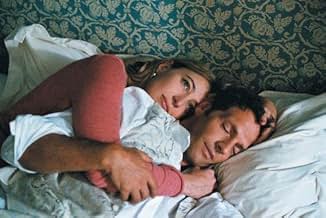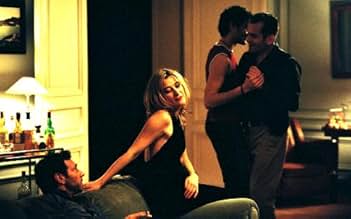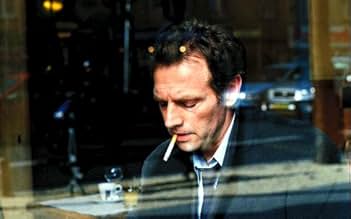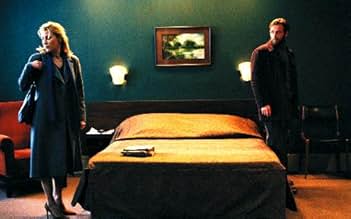CALIFICACIÓN DE IMDb
6.6/10
11 k
TU CALIFICACIÓN
Las cinco etapas del romance entre una mujer y un hombre.Las cinco etapas del romance entre una mujer y un hombre.Las cinco etapas del romance entre una mujer y un hombre.
- Dirección
- Guionistas
- Elenco
- Premios
- 1 premio ganado y 2 nominaciones en total
Valeria Bruni Tedeschi
- Marion
- (as Valeria Bruni-Tedeschi)
Ninon Brétécher
- Sophie
- (as Ninon Bretecher)
- Dirección
- Guionistas
- Todo el elenco y el equipo
- Producción, taquilla y más en IMDbPro
Opiniones destacadas
This film is about 5 segments of the relationship between Gilles and Marion in reverse chronological order.
I thought the reverse chronological order would make it as confusing as "Memento", but actually it is very simple to understand. The film highlights 5 different time segments that is pivotal to the relationship. What happens in between the segments is not mentioned. It leaves the viewers much room for imagination and interpretation.
It is a story about real human beings. No one is flawless. The carnal desire of Gilles, and his shameless expression of it, destroys his love life. Valerie's passionless attitude and negativity destroys her relationship. Marion, on the other hand, gets repeatedly disappointed with life. Everything in the film is so real and close to us, unlike most films that portray fairytale couples or unrealistic lives.
I particularly like the childbirth segment, as emotions are well portrayed and affecting. I think this film is good, but not as groundbreaking as I expected it to be.
I thought the reverse chronological order would make it as confusing as "Memento", but actually it is very simple to understand. The film highlights 5 different time segments that is pivotal to the relationship. What happens in between the segments is not mentioned. It leaves the viewers much room for imagination and interpretation.
It is a story about real human beings. No one is flawless. The carnal desire of Gilles, and his shameless expression of it, destroys his love life. Valerie's passionless attitude and negativity destroys her relationship. Marion, on the other hand, gets repeatedly disappointed with life. Everything in the film is so real and close to us, unlike most films that portray fairytale couples or unrealistic lives.
I particularly like the childbirth segment, as emotions are well portrayed and affecting. I think this film is good, but not as groundbreaking as I expected it to be.
At 5x2 we see the course of a relationship from end to beginning. The reverse chronology of events is now a well established editing technique which almost always works and intrigues the viewer.
The personalities of both Marion and Gilles are established fairly quickly, but the reasoning behind their actions is usually explained at a later time. In fact, this shows how well written 5x2 is, because throughout all five episodes the characters of the protagonists don't change, their behavior has changed due to actions of the other part.
Both actors deliver high caliber performances and their faces write perfectly on the screen. They do create a chemistry when needed (and a lack of again when needed). Can you believe by the way that beautiful Valeria Bruni is forty years old?
The vintage Italian music adds color to the story and Ozon shows he is an accomplished director. As the movie ends he gives us one of the most idyllic scenes ever filmed.
The personalities of both Marion and Gilles are established fairly quickly, but the reasoning behind their actions is usually explained at a later time. In fact, this shows how well written 5x2 is, because throughout all five episodes the characters of the protagonists don't change, their behavior has changed due to actions of the other part.
Both actors deliver high caliber performances and their faces write perfectly on the screen. They do create a chemistry when needed (and a lack of again when needed). Can you believe by the way that beautiful Valeria Bruni is forty years old?
The vintage Italian music adds color to the story and Ozon shows he is an accomplished director. As the movie ends he gives us one of the most idyllic scenes ever filmed.
"5x2" is not the first film to explore a relationship by going backwards from its end to its beginning (Pinter's "Betrayal" comes to mind let alone the mystery in "Memento").
But writer/director François Ozon, aided by superb acting, uses the structure for a thoughtful and intriguing commentary on love and marriage.
The first scene sets up our curiosity as while a lawyer dryly reads the divorce agreement, letting us know the cold facts of the marriage, there is palpable electricity between the about to be ex-wife and husband such that we are not surprised when they immediately head to a hotel, as it turns out their relationship started in a hotel.
We are introduced to the complexities between this couple as their layers are played out through a sexual encounter that is open to "he said, she said" interpretations that will continue as we flashback to key points in their relationship. The other four incidents show them as parents, at the birth of their child, at their wedding and at their meeting, all played out in relation to her parents' long-time conflicted marriage and his brother's homosexual arrangements, amid other encounters.
Valeria Bruni Tedeschi is so luminous as "Marion" that I'm not sure if it's her beautiful acting, as she is in turn up-tight, conflicted, sensual, fragile or aggressive, or her character who changes or that François Ozon is such a sensitive director of women, as he showed in "Swimming Pool" and "Under the Sand (Sous le sable)", that I favored her character, even if we gradually learn that she may or may not be as much of a victim as it seems and she is as much influenced by physical imperatives as he is. Stéphane Freiss plays virtually the opposite of his caring husband in "Le Grand Rôle," even if it becomes less and less clear he's the S.O.B. he at first could appear to be, or if his character experiences any changes or learns anything through serial somewhat monogamy, especially because some details in their past are just left mysterious.
The film is certainly not optimistic about love being an effective basis for a man and a woman to sustain a long term relationship and it leaves open-ended for a gendered discussion about whether that applies to the particulars of these individuals, or to them as French or as Europeans, vs. universals, as Americans would probably interpret their interactions differently than other audiences.
Certainly, in a frankly sexually mature film it's nice to see non-Hollywood bodies, of a zaftig woman and a guy without a personal trainer credit listed.
The frequent use of Paolo Conte songs on the soundtrack add to the ironic feeling surrounding the film, even if the lyrics aren't translated in the many white-on-white subtitles.
Going off into the sunset, and the cinematography and production design, from dark to light, throughout are lovely, hasn't had such an ironic conclusion since the original "Planet of the Apes."
But writer/director François Ozon, aided by superb acting, uses the structure for a thoughtful and intriguing commentary on love and marriage.
The first scene sets up our curiosity as while a lawyer dryly reads the divorce agreement, letting us know the cold facts of the marriage, there is palpable electricity between the about to be ex-wife and husband such that we are not surprised when they immediately head to a hotel, as it turns out their relationship started in a hotel.
We are introduced to the complexities between this couple as their layers are played out through a sexual encounter that is open to "he said, she said" interpretations that will continue as we flashback to key points in their relationship. The other four incidents show them as parents, at the birth of their child, at their wedding and at their meeting, all played out in relation to her parents' long-time conflicted marriage and his brother's homosexual arrangements, amid other encounters.
Valeria Bruni Tedeschi is so luminous as "Marion" that I'm not sure if it's her beautiful acting, as she is in turn up-tight, conflicted, sensual, fragile or aggressive, or her character who changes or that François Ozon is such a sensitive director of women, as he showed in "Swimming Pool" and "Under the Sand (Sous le sable)", that I favored her character, even if we gradually learn that she may or may not be as much of a victim as it seems and she is as much influenced by physical imperatives as he is. Stéphane Freiss plays virtually the opposite of his caring husband in "Le Grand Rôle," even if it becomes less and less clear he's the S.O.B. he at first could appear to be, or if his character experiences any changes or learns anything through serial somewhat monogamy, especially because some details in their past are just left mysterious.
The film is certainly not optimistic about love being an effective basis for a man and a woman to sustain a long term relationship and it leaves open-ended for a gendered discussion about whether that applies to the particulars of these individuals, or to them as French or as Europeans, vs. universals, as Americans would probably interpret their interactions differently than other audiences.
Certainly, in a frankly sexually mature film it's nice to see non-Hollywood bodies, of a zaftig woman and a guy without a personal trainer credit listed.
The frequent use of Paolo Conte songs on the soundtrack add to the ironic feeling surrounding the film, even if the lyrics aren't translated in the many white-on-white subtitles.
Going off into the sunset, and the cinematography and production design, from dark to light, throughout are lovely, hasn't had such an ironic conclusion since the original "Planet of the Apes."
The 'reverse chronology' format, that has now been tried and tested a few times, will perhaps one day become as unshockingly acceptable as the more prosaic use of 'flashbacks'. Both involve non-linear storytelling, and both attempt to grab audience attention by time distortions. Flashbacks are now so commonplace within mainstream films that the 'purist' Dogme movement banned them altogether being so structurally clichéd and rarely justified. So when Ozon's 5 x 2 tells a love story about two people in five chapters, but starting with the last chapter and working forward, is he using a valid artistic device or just being gimmicky? In the opening scene, our loving couple (Marion and Gilles) are finalising the details of their divorce. Afterwards they have a last-fling sexual bout which takes an unpleasant turn. Flipping back scene by scene, we next see them as a loving married and entertaining visitors, chatting away about fidelity and sexual deviance and again we see a slightly unpleasant turn perhaps the seeds of the divorce that we already know will happen. In each chapter we follow the love story to earlier and earlier stages.
In Irreversible, another French film, the reverse chronology format was used to shock, to take us on a journey from hell to heaven. In Memento it was used to heighten suspense and provide the basic device that the mystery revolved upon we never knew more than the main character about what had happened before.
In 5 x 2 the effect is to highlight small things that go wrong in a fairly ordinary relationship. If it were a gradual decline from better to worse they might have gone unnoticed, but our starting point being divorce our interest in why things went wrong is perhaps more acute.
The other thing that marks out this slightly unusual film is the remarkable acting range shown by Valeria Bruni Tedeschi (who won Best Actress at the Venice Film Festival for her portrayal of Marion). We see not only an incredible range of emotion but many sides to her character. The finely nuanced performance draws attention to things like the person a woman may be to her husband whilst still have a secret side, or her ability to put on a brave face when crying inside. The observation of a range of emotional and sexual explorations is done with the attention to detail that seems so intrinsic to much French cinema: the characters really seem to feel what is happening as if there is no camera on them at all. Sadly 5 x 2 however may not have the shock value of film like Irreversible or the sugar-candy feelgood factor of films like Amelie: mainstream foreign audiences like their French movies to nevertheless fulfil certain passive entertainment criteria, which this thinking and understated movie obstinately refuses to do.
In Irreversible, another French film, the reverse chronology format was used to shock, to take us on a journey from hell to heaven. In Memento it was used to heighten suspense and provide the basic device that the mystery revolved upon we never knew more than the main character about what had happened before.
In 5 x 2 the effect is to highlight small things that go wrong in a fairly ordinary relationship. If it were a gradual decline from better to worse they might have gone unnoticed, but our starting point being divorce our interest in why things went wrong is perhaps more acute.
The other thing that marks out this slightly unusual film is the remarkable acting range shown by Valeria Bruni Tedeschi (who won Best Actress at the Venice Film Festival for her portrayal of Marion). We see not only an incredible range of emotion but many sides to her character. The finely nuanced performance draws attention to things like the person a woman may be to her husband whilst still have a secret side, or her ability to put on a brave face when crying inside. The observation of a range of emotional and sexual explorations is done with the attention to detail that seems so intrinsic to much French cinema: the characters really seem to feel what is happening as if there is no camera on them at all. Sadly 5 x 2 however may not have the shock value of film like Irreversible or the sugar-candy feelgood factor of films like Amelie: mainstream foreign audiences like their French movies to nevertheless fulfil certain passive entertainment criteria, which this thinking and understated movie obstinately refuses to do.
The end and beginning of the love of the French couple Marion (Valeria Bruni-Tedeschi) and Gilles (Stéphane Freiss) is disclosed backwards through five moments in their lives:
1st moment: They divorce and have one last brutal intercourse without love.
2nd moment: With their relationship shaken, they have a dinner party with Gilles's gay brother Christophe (Antoine Chappey) and his younger mate, when an infidelity is disclosed at the dinner table.
3rd moment: The troubled pregnancy of Marion and the delivery of their premature son Nicolas, with the total absence of Giles.
4th moment: Their wedding, when Marion commits adultery with an unknown guest of the hotel.
5th moment: .When they meet each other in an Italian resort and begin their relationship.
This simple and realistic movie recalls "Irreversible" (2002), since the screenplay discloses five moments of the relationship of a couple chronologically backwards. I believe the first intention of François Ozon is to remember that behind every divorce, there is a couple that loved each other in the past, that decided to marry each other expecting to live together and raise a family of their own. However, relationships usually deteriorate and time destroys everything including love. In these fragmented glimpses of the lives of Marion and Gilles, the viewer does not see exactly when their love ended, but after their initial encounter, there are many signs suggesting the beginning of the end: the adultery of Marion in the wedding night; the absence of Gilles in the birth of his son; his consented participation in an orgy in the presence of Marion, visibly showing one sort of last attempt to save their empty marriage. Further to the good screenplay, the outstanding and strong performances of the sexy Valeria Bruni-Tedeschi and Stéphane Freiss give the credibility to the characters. My vote is seven.
Title (Brazil): "Amor em 5 Tempos" ("Love in 5 Times")
1st moment: They divorce and have one last brutal intercourse without love.
2nd moment: With their relationship shaken, they have a dinner party with Gilles's gay brother Christophe (Antoine Chappey) and his younger mate, when an infidelity is disclosed at the dinner table.
3rd moment: The troubled pregnancy of Marion and the delivery of their premature son Nicolas, with the total absence of Giles.
4th moment: Their wedding, when Marion commits adultery with an unknown guest of the hotel.
5th moment: .When they meet each other in an Italian resort and begin their relationship.
This simple and realistic movie recalls "Irreversible" (2002), since the screenplay discloses five moments of the relationship of a couple chronologically backwards. I believe the first intention of François Ozon is to remember that behind every divorce, there is a couple that loved each other in the past, that decided to marry each other expecting to live together and raise a family of their own. However, relationships usually deteriorate and time destroys everything including love. In these fragmented glimpses of the lives of Marion and Gilles, the viewer does not see exactly when their love ended, but after their initial encounter, there are many signs suggesting the beginning of the end: the adultery of Marion in the wedding night; the absence of Gilles in the birth of his son; his consented participation in an orgy in the presence of Marion, visibly showing one sort of last attempt to save their empty marriage. Further to the good screenplay, the outstanding and strong performances of the sexy Valeria Bruni-Tedeschi and Stéphane Freiss give the credibility to the characters. My vote is seven.
Title (Brazil): "Amor em 5 Tempos" ("Love in 5 Times")
¿Sabías que…?
- TriviaIn the French edition of the DVD, the director offers a version of the movie titled "2 x 5". This version shows the five sequences in the chronological order, from the moment the couple meets till their divorce. Subtle editing work has been applied to make the movie work.
- ErroresThe scene where the American came to Marion during the wedding night and introduced himself who arrived in France today and would leave tomorrow for LA. Who would just do that? It's just lame.
(Answer: someone not coming from the USA, for instance.)
Selecciones populares
Inicia sesión para calificar y agrega a la lista de videos para obtener recomendaciones personalizadas
- How long is Five Times Two?Con tecnología de Alexa
Detalles
- Fecha de lanzamiento
- País de origen
- Sitios oficiales
- Idiomas
- También se conoce como
- Five Times Two
- Locaciones de filmación
- Productoras
- Ver más créditos de la compañía en IMDbPro
Taquilla
- Presupuesto
- EUR 5,250,784 (estimado)
- Total en EE. UU. y Canadá
- USD 128,752
- Fin de semana de estreno en EE. UU. y Canadá
- USD 15,667
- 12 jun 2005
- Total a nivel mundial
- USD 7,444,906
- Tiempo de ejecución1 hora 30 minutos
- Mezcla de sonido
- Relación de aspecto
- 1.85 : 1
Contribuir a esta página
Sugiere una edición o agrega el contenido que falta

Principales brechas de datos
By what name was 5x2 (2004) officially released in Canada in English?
Responda

























